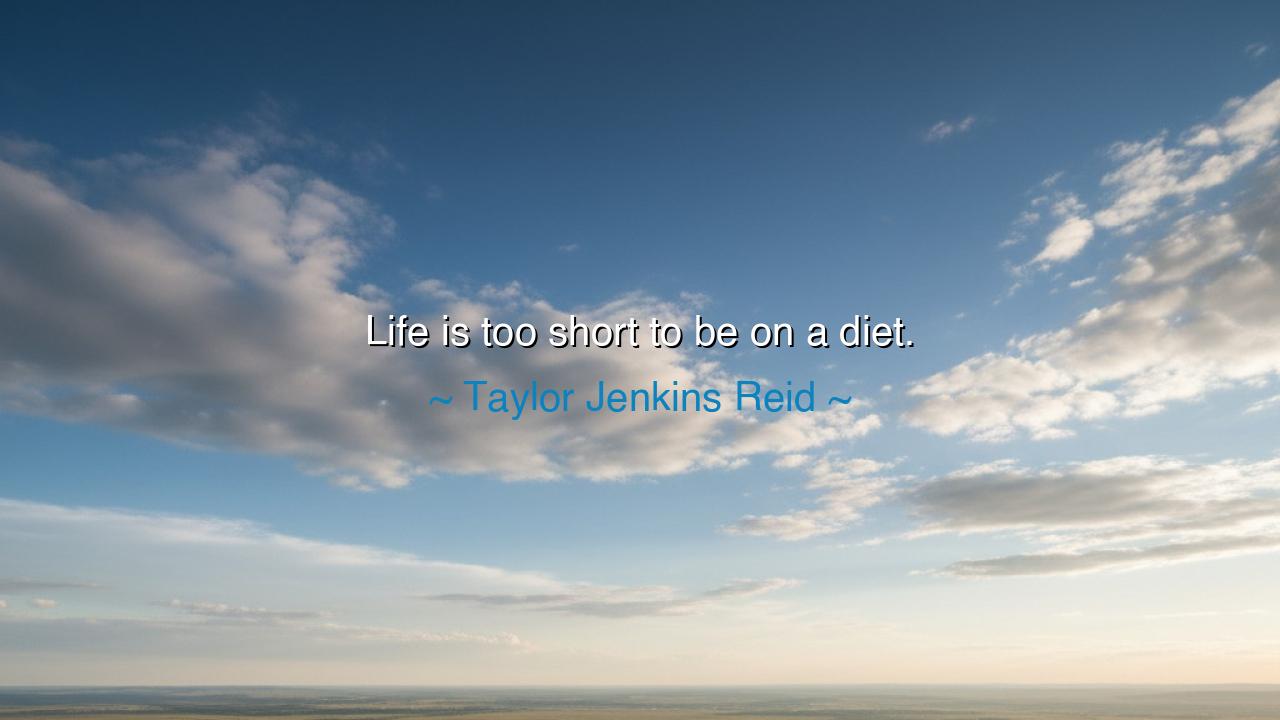
Life is too short to be on a diet.






When Taylor Jenkins Reid said, “Life is too short to be on a diet,” she spoke with the voice of one who has looked beyond the surface of human striving and seen the deeper truth — that life is meant to be lived, not merely managed. Her words are not an indulgence in recklessness, but a hymn to freedom, to joy, to the sacred art of balance. In a world that measures worth by scales and perfection by deprivation, she reminds us that the body is not a cage to be starved into virtue, but a vessel to be cherished, nourished, and celebrated. Her message is ancient in its soul, though modern in its form — for even in the old civilizations, the wise knew that to deny too much of life is to deny life itself.
The ancients often spoke of the Golden Mean — the middle path between excess and restraint. The philosopher Aristotle taught that virtue lies not in extremes, but in balance: neither gluttony nor abstinence, neither indulgence nor obsession. In Reid’s words, we hear this same timeless wisdom. To spend one’s days imprisoned by rules of eating and judgment of body is to forget the gift of existence. The diet, in her quote, is not only a plan of food — it is a symbol of all that limits the spirit, all that chains joy beneath the illusion of control. She calls us to step away from this tyranny and taste, once more, the sweetness of being alive.
Consider the Roman poet Horace, who lived amid the luxuries and ambitions of his age yet wrote of the simple pleasures — bread, olives, and friendship shared under the open sky. He warned against both gluttony and denial, urging his readers to carpe diem, to seize the day. Taylor Jenkins Reid’s declaration echoes that same cry across centuries: “Life is too short.” Indeed, the sand in the hourglass falls swiftly. The feast of life is brief — to spend it counting calories, fearing bread, or shrinking oneself for the approval of others is to miss the very banquet for which we were born.
Her statement also speaks to the modern soul, weary beneath the weight of perfectionism. In our time, the “diet” has become not just a pattern of food, but a culture of constant self-critique — the endless measuring of bodies, worth, and willpower. It is a subtle form of slavery, wrapped in the language of health. Yet Reid’s words are a rebellion, a call to self-acceptance and presence. She reminds us that joy cannot be postponed until we reach an ideal form. The body you have today is already worthy of love, laughter, and the full experience of life’s flavor.
There is an old story told of the Buddha, who, before attaining enlightenment, starved himself nearly to death in his quest for purity. He sat beneath the Bodhi tree, weak and hollow, and realized at last that suffering does not bring awakening. Only balance — the Middle Way — could bring peace. When he accepted a bowl of rice and milk from a kind maiden, he found strength, and in that nourishment, he found clarity. Reid’s words, though playful, carry the same sacred truth: that joy and balance are not luxuries — they are necessities of the soul. Life, fleeting and precious, demands that we eat of it fully.
To say “Life is too short to be on a diet” is not to reject care or health; it is to reject fear. It is to understand that food, like love and art, is part of the divine experience of being human. Every meal shared with others, every taste savored, becomes a prayer of gratitude to the life that flows through us. The wise have always known that to live well, one must eat well — not in excess, but with presence, with joy, with gratitude. A piece of bread eaten with laughter is better than a feast consumed with guilt.
Let this, then, be the lesson: cherish your life while you have it. Do not waste it in constant battle with yourself. Eat with awareness, not anxiety. Move your body because it brings you energy, not punishment. Allow yourself pleasure without shame, for joy is not a sin but a strength. The true “diet” of the soul is one of gratitude, moderation, and delight — to nourish the body as you nourish the heart, to honor life by living it fully.
Thus, as Taylor Jenkins Reid reminds us, life is not a sentence to endure, but a song to be sung. The table of existence is set before you — rich with flavor, laughter, and love. Do not starve yourself of its beauty. Taste deeply, live freely, and remember: life is too short to be on a diet, but just long enough to be alive in every moment.






AAdministratorAdministrator
Welcome, honored guests. Please leave a comment, we will respond soon